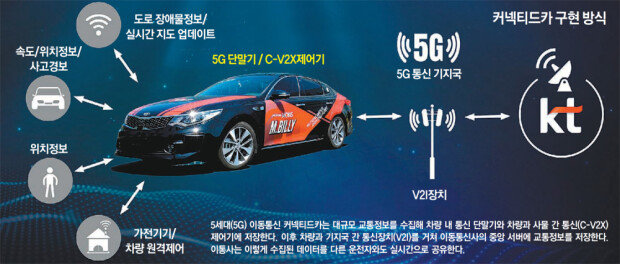Hyundai Mobis, KT join hands for 5G-based connected car technology
Hyundai Mobis, KT join hands for 5G-based connected car technology
Posted January. 18, 2019 07:31,
Updated January. 18, 2019 07:31

Domestic auto component makers are teaming up with information and communication technology (ICT) companies to develop new technologies through technological convergence. They are seeking to develop connected cars by combining autopart makers' manufacturing knowhow with ICT companies' networks and data processing technology. Vehicles mounted with information technology and software devices are called "smart" cars, while those using such devices to minimize the drive's intervention are autonomous, or self-driving, cars. The term "connected cars" refers to future automobiles that combine all those concepts.
Hyundai Mobis Co., South Korea's biggest auto part maker by sales and a key affiliate of Hyundai Motor Group, said Thursday it has partnered with KT Corp. to develop connected car technologies based on the fifth-generation (5G) mobile network.
A connected car is also called a "smartphone on wheels," as they are connected to wireless telecommunication networks, allowing drivers and passengers to check traffic information on a real-time basis or enjoy information technology services. To realize the service, large amounts of traffic information collected by each vehicle has to be transmitted to telecommunication service providers and shared by many other drivers.
Hyundai Mobis plans to develop technology that uses its autonomous car system named "M.Billy" to collect and process traffic data and send them to its central server. KT will develop 5G terminals to be mounted on connected cars. The two companies aim to complete the two technologies within this year and move on to further collaboration projects.
There have already been brisk partnerships formed between global automakers and IT companies. According to market research firm IHS Market, the global connected car sales are expected to grow from 24 million cars in 2015 to 72.5 million in 2023. The market is also expected to expand from 82 trillion won (7.3 billion U.S. dollars) in 2017 to 245 trillion won (21.8 billion dollars) in 2025, an average annual growth of 14.8 percent.
Last year, Mando, another major Korean autopart maker, signed a memorandum of understanding with KT and Naver Labs, a technology subsidiary of Korea's largest Internet portal site Naver, to jointly develop autonomous driving technology. As self-driving cars run while collecting large amounts of traffic information and receiving data from a central server, KT agreed to provide access to its 5G networks under the deal. Naver Labs plans to collate with Mando in artificial technology and self-driving software development.
"Automakers and IT companies form alliances in order to share enormous amounts of research and development costs and reduce risks," said an auto industry official. "There is a growing sense of crisis that without an alliance, carmakers could face difficulties securing core technologies for future cars and lose out in competition."
warum@donga.com







